And the winner is... XCOM: Enemy Unknown
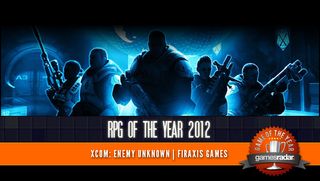
Out of the surprisingly strong crop of RPGs this year, only one was so heavily embraced by the GR staff--played for dozens hours. From the strategy to the controls on down to unforgiving difficulty, XCOM: Enemy Unknown proved that its classic gameplay not only still had a place in gaming, it could be one of the best titles of the year.
For all the praise we could heap on the balance or the restrained way the grim setting is established, XCOMs greatest strength is in its addictive replayability. Similar to what Firaxis has done with its Civilization games, we played XCOM thinking, Just one more turn just one more turn for hours on end. Any game that can pull that off deserves some sort of honor, and fortunately we have just the prize to award it.
Put up your dukes and prepare to fight
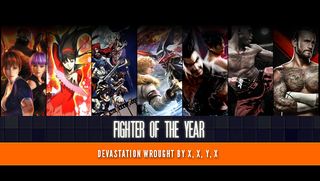
Whether you have a passing fancy for arcade-style fisticuffs, or youre a hardcore fan with thousands of combos stashed in your neural networks, youve got to agree that the future of fighting games has never looked brighter. 2012 didn't start a revolution in the fighting game scene--but it definitely rode the wave of greatness that's been surging through the genre over the past few years. With a potent mix of 2D and 3D contenders, each with their individual strengths, this years releases proved that fighters have graduated from niche status to a genre that's alive and kicking.
Now before you get your form-fitting gi in a bunch, you should know that remakes were off limits for 2012s genre awards; that means no Virtua Fighter 5: Final Showdown. With that in mind, lets take a closer look at the fighters that are eligible for this tournament of 2012 supremacy--and may the best fighting game win.
Dead or Alive 5
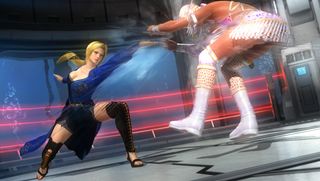
The return of the Dead or Alive franchise strived to present gamers with fighting entertainment--and it delivered in spades. Evolving past a mere fetishization of ninja dudes and large-breasted ladies, this new breed of DOA made the environment as significant a factor as the fighters themselves. The 3D brawling that defined the series is still as much bombastic fun as ever, but the stellar quality of the games presentation gave it the air of a big-budget kung fu flick. Youll be on board the second you participate in a Tag Battle and see your scrappers double-drop-kick the poor opponent. And the inclusion of some fan-favorite Virtua Fighter stars was an unexpected bonus.
Those snarling tigers, electrified grates, and incoming tank shells in the background werent just for show, either: Get slammed onto the wrong side of the arena by a Critical Burst, and one of these inventive stage hazards is liable to light you up. It supercharges every match with a cinematic sense of excitement, where a derailing train or crumbling construction site merely sets the stage for the frenetic brawling.
Tekken Tag Tournament 2

Tekken fans have waited ages for a follow-up to one of the best arcade tag battles--and Tekken Tag Tournament 2 makes the wait indubitably worth it. With a staggeringly humongous cast of brawlers and the same wall-bouncing, floor-smashing fighting that series fans adore, its pretty much the best Tekken title money can buy. Few things in gaming are as satisfying as the sensation of chaining a massive combo with well-timed tag-ins, or slapping your opponent silly when theyre cornered in one of the vivacious arenas.
The music alone has the power to get anyone hyped, in addition to the heavy hitting combos. TTT2 also delivered the World Tekken Federation, a fully-integrated online profile that gets far less credit than it deserves. By grouping all your habits, specialties, and pugilistic preferences into one place, along with the stats for the best players around, it offers a wealth of invaluable info for those looking to up their Tekken skills. That kind of innovative feature is exactly what we want to see more of in the fighting game scene.
Persona 4 Arena
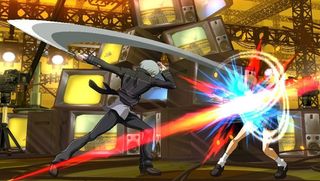
Turns out, RPG premises can make for utterly enthralling fighting games. Taking the much-adored cast of chipper high school students from Persona 4 (and a couple from Persona 3) and dropping them into a 2D anime fighter was a stroke of Japanese genius, creating a hybridized game thatll appeal to fans of either genre. Developed by the minds behind the beloved BlazBlue and Guilty Gear franchises, its a given that the core mechanics would be fine-tuned to perfection. But the way the game incorporates the Midnight Channels intrigue and shows such love to its characters is a large part of what makes it so special.
With dozens of hours of story-based content, this is one of the few fighting games you could play just to see the new, canonical plot unfold. Each character in the just-the-right-size roster plays wildly different from one another, utilizing nifty gimmicks in addition to their show-stopping Persona summons. With gorgeous sprites, impressive character balance, and a mirror-finish level of polish, its pretty much the whole fighting game package with some delicious RPG sprinkled on top. And oh, that music--bestill our Japanese-pop-loving hearts.
UFC Undisputed 3
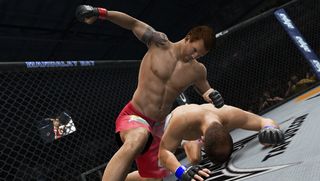
Theres something immediately relatable about a fighting game where kicking someone in the head is one of the worst things you can do to them. Youre not ripping out hearts, or throwing fireballs at enemies--youre simply beating the snot out of them. Maybe thats why some of us prefer the UFC series of games to its more complicated contemporaries, even if its not as technical as a game like Dead or Alive or Tekken.
That doesnt make it any less fun, though. THQs latest (and final) UFC game improved over the past titles in every way, iterating and polishing every mechanic to near-perfection. Theres bountiful content thanks to the inclusion of Pride mode, and improved controls made it so anyone could pick up and play the game without wading through a sea of of tutorials. And hey! It even managed to include a fairly competent submission system, the white whale of MMA games. That, alone, is worth celebrating.
Soulcalibur V

After Soulcalibur IV failed to reposition the series as a top fighting game amongst its peers, Namco bounced back with Soulcalibur V. The weapon-based combat was stronger than ever, simple enough to grasp but with crazy combos and flashy attacks just beneath the surface. Meanwhile, the roster received a major update thanks to the plot jumping forward 17 years, adding 10 new characters to the series--a considerable number for a franchise as well-established as SC.
Though the story wasnt all it could have been, the devs more than made up for it with a much-improved character creator mode, and the online was similarly refined compared to the previous edition. Add to that the welcome (and surprising) playable guest appearance of Assassins Creeds Ezio and some sensational super attacks, and you have the best Soulcalibur in years.
Skullgirls
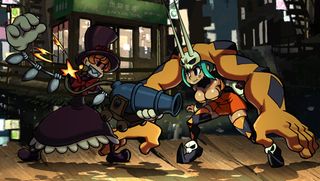
Equal parts zippy style and technical complexity, Skullgirls is an American-made heir to the Japanese gold standard for fighting game development: by hardcore 2D fighting fans, for hardcore 2D fighting fans. This all-girls fighter might not have the ridiculously huge cast of games like Tekken or Marvel vs. Capcom--but what it lacked in roster size, it more than made up for in panache. The living-comic-book aesthetic and silky smooth animations are infinitely easy on the eyes, and the inimitable femme fatale pugilists spanned the spectrum from sexy ninja nurse to horrific mutant nun.
Being able to balance your game for anywhere between 1v1 and 3v3 bouts is a tremendous feat in and of itself, but Skullgirls pulls it off with grace. And, if were being honest, homicidal tyke Peacock is probably one of the most refreshing fighting game characters weve seen in the last decade. Once we witnessed her bevy of zany, old-timey animations--including chucking bowling balls, firing a sword out of her revolver, or exhaling cigar smoke out of her eye--we were instant fans.
WWE 13
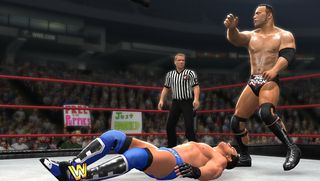
Some might argue over whether the fake fighting of WWE isnt as real as some of the other nominees on the list. But wrestling matches have winners, losers, and finishing moves, so thats good enough for us. WWE 13 did a great job of re-establishing the sports entertainment franchise after publisher THQ ditched the SmackDown brand last year. But for all the advancements in Create-A-Superstar, online play, and match pacing, WWE 13s greatest strength was in its tribute to wrestlings storied past.
Current champ CM Punk may be the cover star, but the real attraction is Attitude Mode, WWE 13s campaign that takes players on an interactive tour of WWEs late-90s heyday. Dozens of wrestlers of that era are included, from champs like Stone Cold Steve Austin on down to lesser-known stars like Gangrel, which is why the game boasts one of the deepest rosters THQ has ever had. Even with virtually no competition in the realm of wrestling games, WWE 13 proves the series isnt ready to slow down yet.
And the winner is Persona 4 Arena
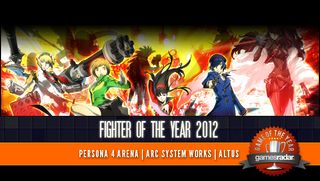
With the exception of Skullgirls, which offered everything that could fit in a downloadable title, nearly every title on this list is part of a well-established fighting franchise. But Persona 4 Arena tried something refreshingly different--the adaptation of an RPG in fighting game form--and absolutely nailed the execution. Few new fighting games have had this strong a debut, delivering on the graphics, sound, control, and balance fronts so stunningly well without a preceding game to iterate upon. Blending BlazBlue with JoJos Bizarre Adventure and sprinkling a bevy of unique mechanics on top, P4A stood out from 2012s parade of fighting game sequels.
No two contenders in the games P-1 Grand Prix play quite alike, and they stray far outside the bounds of your typical fighting game archetypes. Healing, ranged gunplay, magnetized boxing, smashing fools with a folding chair--youll encounter all of these inventive styles as you fight your way through the trippy, supernatural dimension of the Midnight Channel. P4A shines with everything that makes 2D anime fighters great, bringing together two unalike genres under one gloriously chaotic roof.

